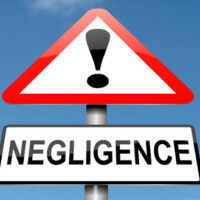What is Negligence Per Se?

Many people are under the mistaken belief that to be negligent, and thus liable to pay damages for someone else’s personal injuries, that you must have broken a law, rule, or statute. In fact, negligence does not require that a law be broken—it only requires that someone failed to act as a reasonable and diligent person would.
Negligence Per Se
But what happens when someone does break a law? Is that automatic evidence of negligence? When someone injures you by doing something or failing to do something, and their actions constitute a violation of a law, the legal theory called “negligence per se” comes into play.
Examples of negligence per se, include:
- Falling on stairs because the stairwell did not have legally required handrails, or because the stairs themselves violated established building codes that govern stairway safety standards
- An elevator malfunction, where the elevator has not been serviced to the extent that the law requires
- An exposed powerline, which was not maintained or protected as the law requires, electrocutes a victim
- Someone is injured in a pool that does not have required safety measures or devices, such as drain protectors
Reduced Proof Standards
When someone breaks a law, and injures someone else, the victim does not need to show that the liable party acted in a way that others would not act, or that the liable party acted unreasonably. The victim does not have to ask the jury to determine if the other party acted in a way that a reasonably prudent person would not act.
All the victim has to prove is that the law is or was broken, and that the injury caused is the type of injury that the law is designed to protect. The victim also has to show that he or she is in a class of people that the law was designed to protect.
Negligence Per Se – An Example
For example, let’s assume that a bar serves a minor too much alcohol, and the minor gets in a car, and injures someone else. The bar could be liable for negligence per se, given that serving alcohol to a minor is illegal, and this kind of accident is an accident that the law was designed to avoid.
Alternatively, imagine that the minor gets in his car, and while putting gas in the car, because the minor is drunk, the minor sets the gas station on fire, causing an injury. In that case, negligence per se against the bar may not apply, because that kind of accident is not the type of injury or accident the law which prohibits serving minors was designed to protect or avoid (the bar or the minor could still be liable for negligence, of course, but not for negligence per se).
The Tampa personal injury attorneys at Barbas, Nuñez, Sanders, Butler & Hovsepian can help you if you are injured in an accident. Call us today to discuss obtaining damages after any type of accident. Schedule a consultation today.
https://www.barbaslaw.com/what-is-uninsured-motorist-coverage-and-do-i-need-it/




